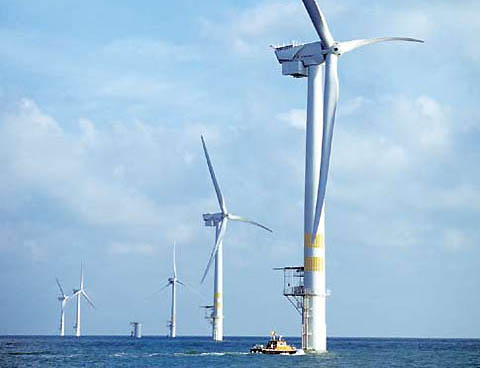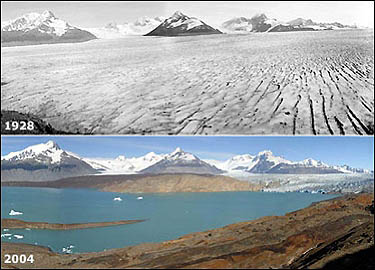www.islandbreath.org ID#0603-01
SOURCE: JUAN WILSON juanwilson@mac.com
If you want the lights on "Not in my back yard" won't cut it
11 February 2006 - 8:30pm

windmills like these off the coast of Ireland
have been proposed near Nantucket, Massachusetts
| No
More Mr. Nice Guy Climate change is pushing this easygoing enviro over the edge by Bill McKibben on 12 Januay 2006 in Grist Magazine The one and only time I ever saw my mother become aggressive in public went like this. We were out as a family for a weekend leaf-peeping drive, an impulse apparently shared by most of the rest of New England, because the traffic along New Hampshire's Kancamagus Highway was endless 90-degree gridlock. Every once in a while, however, somebody would zoom happily by in the breakdown lane. We watched them with a kind of mounting zealous anger. It would never have occurred to my parents to emulate them -- that would have been wrong. But eventually my mother, sitting in the passenger seat, could take it no longer. She rolled down the window of our Plymouth, stuck out her head, shook her finger at one of the passing lawbreakers, and yelled ... "Unpleasant!" I'm by nature a conflict avoider too -- if you're thinking of cutting in line at the supermarket, you couldn't ask for an easier mark than me. But twice last week I acted in ways entirely out of character. I signed a letter criticizing Robert F. Kennedy Jr. for his New York Times op-ed opposing the big Cape Wind project. And I wrote a few paragraphs disparaging the most powerful of my local environmental groups, the Adirondack Council, for the way they'd worked on clean-air issues. Both criticisms were respectful -- I am my mother's son -- but they were also stern. I wouldn't have enjoyed being on the receiving end of either one (though a lifetime of book writing does tend to inure you to bad reviews). They were also, at some level, divisive. In both cases, you could truthfully say I was willing to inflict a little damage on an important part of the environmental movement. It doesn't mean, I hope, that I'm growing a mean streak. I think it means something else: that the environmental movement is reaching an important point of division, between those who truly get global warming, and those who don't. By get, I don't mean understanding the chemistry of carbon dioxide, or the importance of the Kyoto Protocol, or something like that -- pretty much everyone who thinks of themselves as an environmentalist has reached that point. By get, I mean understanding that the question is of transcending urgency, that it represents the one overarching global civilizational challenge that humans have ever faced. That it's as big as the Bomb. Do I think Bobby Kennedy Jr. is a bad environmentalist? No, I think he's a great environmentalist. I've heard him convert 400 Republicans at one fell swoop in the auditorium of my Adirondack high-school gym. Hell, by helping establish the Hudson Riverkeeper, the guy added a whole new class of words to our vocabulary -- now there are baykeepers and airkeepers and summitkeepers. He's sued and written and organized with passion and prowess. But his op-ed on Cape Wind, with its (risible) fear that the windmills might be heard ashore, showed that he hadn't quite understood just how critical the need to get the U.S. off fossil fuels really is. In the face of that need, even possible damage to the livelihoods of commercial fishers is distinctly secondary. If someone were proposing to erect a giant blender in Nantucket Sound so yachtsmen could obtain frozen margaritas more conveniently, then Bobby would be right to object, and the rest of us would go along with him. Instead, they're talking about the nation's first big offshore wind complex, one that would in effect allow residents of Cape Cod to use electricity nine months of the year without emitting a single carbon atom. If we had decades to burn, then he'd also doubtless be right that there's a better site for the thing, and a nicer developer. There's always a better site and a nicer developer. But in the real world, according to Rajendra Pachauri, the chair of the Intergovernmental Panel on Climate Change, we have at most 10 years to reverse this trend. Which means we have to do everything quickly -- hybrid cars and solar panels and compact light bulbs and local food and tree planting. And windmills, lots and lots of windmills, just like off the shores of Europe. In the best of all possible worlds, we'd do everything slowly and carefully -- but this planet is rapidly becoming the worst of all possible worlds, a place that before my daughter dies may well see temperatures exceeding anything since before the dawn of primate evolution. A planet facing hundreds of millions of environmental refugees as a result of rising seas, with heat waves like the one that killed 35,000 in Europe becoming commonplace occurrences. I mean, we went through the usual hurricane alphabet this past year, and got all the way to the Greek letter Zeta. |
SOURCE: JUAN WILSON juanwilson@mac.com
Debate on Climate Shifts to Issue of Irreparable Change
29 January 2006 - 7:00am

Argentina's Upsala Glacier was once the biggest
in South America
| Tipping
Point: When It Is Too Late to Act by Juliet Eilperin on 29 January 2006 in the Washington Post Now that most scientists agree human activity is causing Earth to warm, the central debate has shifted to whether climate change is progressing so rapidly that, within decades, humans may be helpless to slow or reverse the trend. This "tipping point" scenario has begun to consume many prominent researchers in the United States and abroad, because the answer could determine how drastically countries need to reduce their greenhouse gas emissions in the coming years. While scientists remain uncertain when such a point might occur, many say it is urgent that policymakers cut global carbon dioxide emissions in half over the next 50 years or risk the triggering of changes that would be irreversible. There are three specific events that these scientists describe as especially worrisome and potentially imminent, although the time frames are a matter of dispute: widespread coral bleaching that could damage the world's fisheries within three decades; dramatic sea level rise by the end of the century that would take tens of thousands of years to reverse; and, within 200 years, a shutdown of the ocean current that moderates temperatures in northern Europe. The debate has been intensifying because Earth is warming much faster than some researchers had predicted. James E. Hansen, who directs NASA's Goddard Institute of Space Studies, last week confirmed that 2005 was the warmest year on record, surpassing 1998. Earth's average temperature has risen nearly 1 degree Fahrenheit over the past 30 years, he noted, and another increase of about 4 degrees over the next century would "imply changes that constitute practically a different planet." "It's not something you can adapt to," Hansen said in an interview. "We can't let it go on another 10 years like this. We've got to do something." Princeton University geosciences and international affairs professor Michael Oppenheimer, who also advises the advocacy group Environmental Defense, said one of the greatest dangers lies in the disintegration of the Greenland or West Antarctic ice sheets, which together hold about 20 percent of the fresh water on the planet. If either of the two sheets disintegrates, sea level could rise nearly 20 feet in the course of a couple of centuries, swamping the southern third of Florida and Manhattan up to the middle of Greenwich Village. While both the Greenland and the Antarctic ice sheets as a whole are gaining some mass in their cold interiors because of increasing snowfall, they are losing ice along their peripheries. That indicates that scientists may have underestimated the rate of disintegration they face in the future, Oppenheimer said. Greenland's current net ice loss is equivalent to an annual 0.008 inch sea level rise. The effects of the collapse of either ice sheet would be "huge," Oppenheimer said. "Once you lost one of these ice sheets, there's really no putting it back for thousands of years, if ever." Last year, the British government sponsored a scientific symposium on "Avoiding Dangerous Climate Change," which examined a number of possible tipping points. A book based on that conference, due to be published Tuesday, suggests that disintegration of the two ice sheets becomes more likely if average temperatures rise by more than 5 degrees Fahrenheit, a prospect "well within the range of climate change projections for this century." The report concludes that a temperature rise of just 1.8 degrees Fahrenheit "is likely to lead to extensive coral bleaching," destroying critical fish nurseries in the Caribbean and Southeast Asia. Too-warm sea temperatures stress corals, causing them to expel symbiotic micro-algae that live in their tissues and provide them with food, and thus making the reefs appear bleached. Bleaching that lasts longer than a week can kill corals. This fall there was widespread bleaching from Texas to Trinidad that killed broad swaths of corals, in part because ocean temperatures were 2 degrees Fahrenheit above average monthly maximums. Many scientists are also worried about a possible collapse of the Atlantic thermohaline circulation, a current that brings warm surface water to northern Europe and returns cold, deep-ocean water south. Hans Joachim Schellnhuber, who directs Germany's Potsdam Institute for Climate Impact Research, has run multiple computer models to determine when climate change could disrupt this "conveyor belt," which, according to one study, is already slower than it was 30 years ago. According to these simulations, there is a 50 percent chance the current will collapse within 200 years. Some scientists, including President Bush's chief science adviser, John H. Marburger III, emphasize there is still much uncertainty about when abrupt global warming might occur. "There's no agreement on what it is that constitutes a dangerous climate change," said Marburger, adding that the U.S. government spends $2 billion a year on researching this and other climate change questions. "We know things like this are possible, but we don't have enough information to quantify the level of risk." This tipping point debate has stirred controversy within the administration; Hansen said senior political appointees are trying to block him from sharing his views publicly. When Hansen posted data on the Internet in the fall suggesting that 2005 could be the warmest year on record, NASA officials ordered Hansen to withdraw the information because he had not had it screened by the administration in advance, according to a Goddard scientist who spoke on the condition of anonymity. More recently, NASA officials tried to discourage a reporter from interviewing Hansen for this article and later insisted he could speak on the record only if an agency spokeswoman listened in on the conversation. "They're trying to control what's getting out to the public," Hansen said, adding that many of his colleagues are afraid to talk about the issue. "They're not willing to say much, because they've been pressured and they're afraid they'll get into trouble." But Mary L. Cleave, deputy associate administrator for NASA's Office of Earth Science, said the agency insists on monitoring interviews with scientists to ensure they are not misquoted. "People could see it as a constraint," Cleave said. "As a manager, I might see it as protection." John R. Christy, director of the Earth Science System Center at the University of Alabama in Huntsville, said it is possible increased warming will be offset by other factors, such as increased cloudiness that would reflect more sunlight. "Whatever happens, we will adapt to it," Christy said. Scientists who read the history of Earth's climate in ancient sediments, ice cores and fossils find clear signs that it has shifted abruptly in the past on a scale that could prove disastrous for modern society. Peter B. deMenocal, an associate professor at the Lamont-Doherty Earth Observatory of Columbia University, said that about 8,200 years ago, a very sudden cooling shut down the Atlantic conveyor belt. As a result, the land temperature in Greenland dropped more than 9 degrees Fahrenheit within a decade or two. "It's not this abstract notion that happens over millions of years," deMenocal said. "The magnitude of what we're talking about greatly, greatly exceeds anything we've withstood in human history." These kinds of concerns have spurred some governments to make major cuts in the carbon dioxide emissions linked to global warming. Britain has slashed its emissions by 14 percent, compared with 1990 levels, and aims to reduce them by 60 percent by 2050. Some European countries, however, are lagging well behind their targets under the international Kyoto climate treaty. David Warrilow, who heads science policy on climate change for Britain's Department of Environment, Food and Rural Affairs, said that while the science remains unsettled, his government has decided to take a precautionary approach. He compared consuming massive amounts of fossil fuels to the strategy of the Titanic's crew, who were unable to avoid an iceberg because they were speeding across the Atlantic in hopes of breaking a record. "We know there are icebergs out there, but at the moment we're accelerating toward the tipping point," Warrilow said in an interview. "This is silly. We should be doing the opposite, slowing down whilst we build up our knowledge base." The Bush administration espouses a different approach. Marburger said that though everyone agrees carbon dioxide emissions should decline, the United States prefers to promote cleaner technology rather than impose mandatory greenhouse gas limits. "The U.S. is the world leader in doing something on climate change because of its actions on changing technology," he said. Stanford University climatologist Stephen H. Schneider, who is helping oversee a major international assessment of how climate change could expose humans and the environment to new vulnerabilities, said countries respond differently to the global warming issue in part because they are affected differently by it. The small island nation of Kiribati is made up of 33 small atolls, none of which is more than 6.5 feet above the South Pacific, and it is only a matter of time before the entire country is submerged by the rising sea. "For Kiribati, the tipping point has already occurred," Schneider said. "As far as they're concerned, it's tipped, but they have no economic clout in the world." |
SOURCE: JUAN WILSON juanwilson@mac.com
The discover of the Gaia principal despairs
17 January
2006 - 5:00pm

"Gaia" © 1989 by Alex Grey www.alexgrey.com
by James Lovelock on 16 January 2006 in The Indeapendent The Earth is
about to catch a morbid fever that may last as long as 100,000 years.
Each nation must find the best use of its resources to sustain civilisation
for as long as they can. |
see also:
Island Breath: Twenty Years to Correct Climate Change
Island Breath: Clinton on Global Warming - Dec 2004
Island Breath: God Must Hate Florida - Oct 2004
Island Breath: The Day After Tomorow - May 2004
Island Breath: A cuationary tale - Mar 2004
Island Breath: Gore on Global Warming Jan - 2004